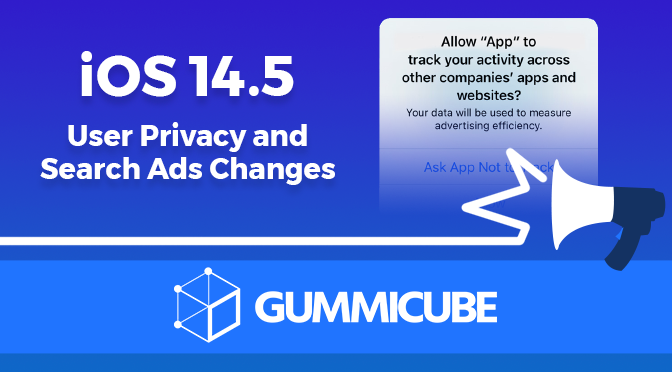
Apple’s Child Safety Updates: ASO Takeaways
Posted on March 28th, 2025
Apple’s child safety updates will impact App Store visibility for certain age groups. Learn how these changes affect ASO and how to optimize for your audience.

This week, Apple launched the latest update to iOS and iPadOS with version 14.5. In a move that has shaken the world of digital advertising, Apple implemented a new privacy policy, App Tracking Transparency (ATT), that will change the advertising landscape for Apple users.
Hand-in-hand with this groundbreaking policy comes a new Apple Search Ads placement in the Suggested Apps area of the Apple App Store, which has been the subject of criticism by digital advertising giants.
User privacy in the digital advertising realm has been a subject of hot debate for the past few years. The European Union and the State of California both adopted stricter privacy regulations in 2018 with the General Data Protection Regulation (GDPR) and California Consumer Privacy Act (CCPA), respectively.
Governmental actions such as these, alongside initiatives from tech giants like Google’s Federated Learning of Cohorts and the end of third-party cookies in Chrome, all point to an imminent reconfiguration on how corporations may collect and use personal data.
It should come as no surprise that the behemoth Apple is on the cutting edge of new developments in advertising integration that will preserve the privacy of personal data. Apple iOS version 14.5 has provided users with more control over who can access sensitive information. App Tracking Transparency will require users to give explicit consent to companies wishing to access their IDFA, or Identifier for Advertisers, something many users may not want to opt into.
Critics of this move claim that it is smaller digital companies that will see the most damages from such a policy, saying that the large digital advertising companies will be insulated by massive stores of proprietary datasets. An additional criticism states that this will be a significant rollback on advances in targeted advertising, like engagement metrics measurements and experiments. The big drawback, according to those against ATT, is that not only will ads be less effective for advertisers, but also less relevant and enjoyable for users.
In a bid to help advertisers adjust to this change, Apple is offering a proprietary advertising measurement solution called SKAdNetwork (SKAD). SKAD will provide advertisers with relevant performance data at the campaign level, with restrictions on user visibility. One such measure in place is a random time delay between user action and data reporting.
This will enable advertisers to use statistical methods to collect data while preventing them from being able to identify any one individual user. This is one example of differential privacy, which we will see rising to prominence over the next few years, as Android has a similar plan for 2022.
Apple also introduced a new advertising area in the iOS App Store for advertisers to bid on. Apple Search Ads now features a sponsored app in the Suggested Apps area of the store. Whereas previously search ads only appeared after a user searched a prompting keyword, this new slot will remain populated with ads prior to any input on the user’s part.
This will allow Apple to have tighter control over the user experience and content curation in the App Store. Apple has high standards for creatives and tone, and by fully vetting ads before they appear to users they can preserve this ambience.
The combination of updated privacy rules as well as this new ad spot has brought criticism from advertising giant Facebook. Facebook has started a campaign to protest Apple’s new policies, stating that Apple has less concern for user privacy and more concern for growing as an advertising company. Facebook and other critics have said that this move will kick other advertisers off of the platform, forcing developers to work solely with Apple when it comes to advertising.
Big changes are underway with Apple’s iOS 14.5 update. Users will now see an additional advertisement while in the Apple App Store, featured as the first result in the Suggested Apps section. In a huge move forward on consumer data privacy protections, Apple’s App Tracking Transparency framework gives users more control over with whom they share their data and when.
Apple has also provided advertisers with their own measurement solution, SKAD, which will enable behavior linked data collection while preserving user privacy. While under fire from a handful of digital advertising megacorporations, the broader landscape suggests Apple is leading the way for rolling changes in how companies may collect, use, and sell personal data.
Want to learn more about App Store Optimization? Contact Gummicube, and we’ll help get your strategy started.

Apple’s child safety updates will impact App Store visibility for certain age groups. Learn how these changes affect ASO and how to optimize for your audience.

Google Play Games expands with new titles and PC support. Discover what this means for ASO and how to stay ahead in the evolving mobile gaming landscape.

Discover the March 2025 update to Apple Business Manager, and learn how it enhances device tracking, compliance, and operational efficiency for businesses.